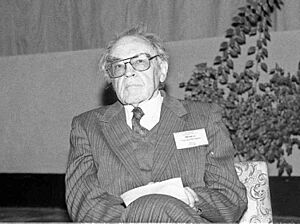Sigurd Schmidt facts for kids
Quick facts for kids
Sigurd Schmidt
|
|
|---|---|
 |
|
| Born |
15 May 1922 |
| Died | 22 May 2013 (aged 91) Moscow, Russian Federation
|
| Nationality | USSR Russia |
| Alma mater | Moscow University |
| Scientific career | |
| Fields | History |
| Institutions | Russian State University for the Humanities |
Sigurd Ottovich Schmidt (Russian: Сигурд Оттович Шмидт; 15 May 1922 – 22 May 2013) was an important Russian historian, ethnographer, and teacher. He was known for his deep knowledge of Russian history, especially the 16th and 17th centuries. He also helped protect historical buildings and old documents.
Contents
Sigurd Schmidt's Life Story
Sigurd Ottovich Schmidt was born in Moscow on May 15, 1922. His father was a famous mathematician named Otto Schmidt. His mother, Margarita Golosovker, was a literary critic.
Sigurd Schmidt studied history at Moscow University. He graduated in 1944. In 1949, he started teaching at the Moscow Historical Archives Institute. This institute is now part of the Russian State University for the Humanities.
He earned his highest history degree, Doctor of Historical Sciences, in 1965. Later, he became an Honorary Doctor and a Professor at the university. From 1956, he also worked at the Institute of Russian History.
Leading Important Groups
From 1968 to 2006, Sigurd Schmidt led the Archaeographic Commission. This group works with old documents and archives. After that, he became its Honorary President.
He was also part of the Presidential Council. This council protects valuable Russian cultural items. He was on many scientific and editing boards too. Schmidt led the All-Russia Society of Local Studies. He also edited the "Archaeography Yearbook" and Moscow's encyclopedia.
He helped lead a project called "History of Moscow, from ancient times to the present day." He also headed a center for studying local history and Moscow.
Since 1949, he guided a student science club. This club focused on the "Source of National History."
His Work and Writings
Schmidt edited over 500 scientific works. These works covered cultural history, how history is written, archaeology, and archives. His studies on Russia's history in the 16th and 17th centuries are very important.
Awards and Recognition
Sigurd Schmidt received many honors for his work. In 1989, he was named an Honored Scientist of Russia. He became an Academician of the Russian Academy of Education in 1992. In 1997, he was made a Foreign Member of the Polish Academy of Sciences.
He won the Russian Government Prize in Education in 1999. In 2007, he received the "For services to Moscow" award.
The famous scholar Dmitry Likhachev praised Schmidt. He called him a "scholar-historian of a broad plan." Likhachev also said Schmidt was an organizer of science and a mentor for young scientists. He spent a lot of time protecting historical sites and old manuscripts. Many called him the best expert on 16th-century Russian history sources.
In 2009, he received the "Triumph" award for his work in the humanities.
Schmidt's School for Historians
Starting in 1949, Sigurd Schmidt led a student science group. It was called the Source of national history club. Dmitry Likhachev said this club became "a school not only of science but also of civil behavior."
At first, it was just Schmidt's students. But soon, it attracted many other students and teachers. Everyone in the group shared their research and learned from each other. Because of this, the club became known as the "Schmidt's School." It was a top-level place for studying historical sources. Many important works were created in this group. An Italian historian named Giuseppe D'Amato was one of his students.
Sigurd Schmidt's Books
Sigurd Schmidt wrote and edited many books about Russian history. Here are some of his important works:
- The Formation of Russian Samoderzhavstva: This book looked at how the Russian government became powerful during the time of Ivan the Terrible.
- Russia's State in the Middle of the 16th Century: This work explored the imperial archives and Ivan the Terrible's time.
- Archeology. Archival. Pamyatnikovedenie: A collection of his papers on archaeology, archives, and monuments.
- The Path of the Historian: This book gathered his writings on how history is studied and written.
- Russia's Ivan the Terrible: Another book focusing on the famous Russian ruler.
- The Public Consciousness of Russia's Noble Birth: This book studied the thoughts of Russian nobles from the 17th to the early 19th century.
 | Valerie Thomas |
 | Frederick McKinley Jones |
 | George Edward Alcorn Jr. |
 | Thomas Mensah |

